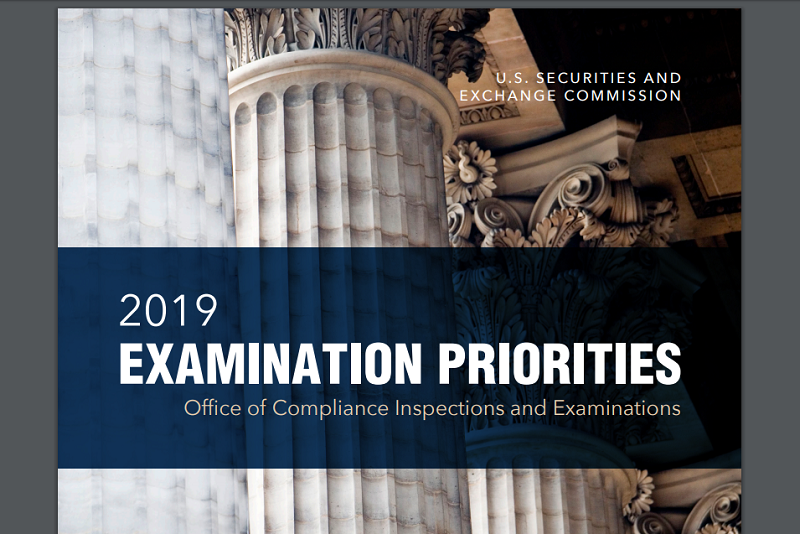BROWSE BY TOPIC
- Bad Brokers
- Compliance Concepts
- Investor Protection
- Investments - Unsuitable
- Investments - Strategies
- Investments - Private
- Features/Scandals
- Companies
- Technology/Internet
- Rules & Regulations
- Crimes
- Investments
- Bad Advisors
- Boiler Rooms
- Hirings/Transitions
- Terminations/Cost Cutting
- Regulators
- Wall Street News
- General News
- Donald Trump & Co.
- Lawsuits/Arbitrations
- Regulatory Sanctions
- Big Banks
- People
TRENDING TAGS
Stories of Interest
- Sarah ten Siethoff is New Associate Director of SEC Investment Management Rulemaking Office
- Catherine Keating Appointed CEO of BNY Mellon Wealth Management
- Credit Suisse to Pay $47Mn to Resolve DOJ Asia Probe
- SEC Chair Clayton Goes 'Hat in Hand' Before Congress on 2019 Budget Request
- SEC's Opening Remarks to the Elder Justice Coordinating Council
- Massachusetts Jury Convicts CA Attorney of Securities Fraud
- Deutsche Bank Says 3 Senior Investment Bankers to Leave Firm
- World’s Biggest Hedge Fund Reportedly ‘Bearish On Financial Assets’
- SEC Fines Constant Contact, Popular Email Marketer, for Overstating Subscriber Numbers
- SocGen Agrees to Pay $1.3 Billion to End Libya, Libor Probes
- Cryptocurrency Exchange Bitfinex Briefly Halts Trading After Cyber Attack
- SEC Names Valerie Szczepanik Senior Advisor for Digital Assets and Innovation
- SEC Modernizes Delivery of Fund Reports, Seeks Public Feedback on Improving Fund Disclosure
- NYSE Says SEC Plan to Limit Exchange Rebates Would Hurt Investors
- Deutsche Bank faces another challenge with Fed stress test
- Former JPMorgan Broker Files racial discrimination suit against company
- $3.3Mn Winning Bid for Lunch with Warren Buffett
- Julie Erhardt is SEC's New Acting Chief Risk Officer
- Chyhe Becker is SEC's New Acting Chief Economist, Acting Director of Economic and Risk Analysis Division
- Getting a Handle on Virtual Currencies - FINRA
ABOUT FINANCIALISH
We seek to provide information, insights and direction that may enable the Financial Community to effectively and efficiently operate in a regulatory risk-free environment by curating content from all over the web.
Stay Informed with the latest fanancialish news.
SUBSCRIBE FOR
NEWSLETTERS & ALERTS
SEC Publishes OCIE's 2019 Examination Priorities
by Howard Haykin
The SEC’s Office of Compliance Inspections and Examinations (OCIE) published its 2019 examination priorities – to promote transparency of its examination program and provide insights into the areas it believes present potentially heightened risk to investors or the integrity of the U.S. capital markets.
This year’s particular emphasis will be on: (i) digital assets; (ii) cybersecurity; and, (iii) matters of importance to retail investors, including fees, expenses, and conflicts of interest. With that, OCIE's 2019 exam priorities are broken down into the following 6 categories:
1) COMPLIANCE AND RISKS IN CRITICAL MARKET INFRASTRUCTURE. OCIE exams of clearing agencies, national securities exchanges, transfer agents, and other such firms will focus on certain aspects of the operations and compliance with recently effective rules.
2) RETAIL INVESTORS, INCLUDING SENIORS AND THOSE SAVING FOR RETIREMENT. OCIE exams will focus on the disclosure and calculation of fees, expenses, and other charges investors pay, the supervision of representatives selling products and services to investors, broker-dealers entrusted with customer assets, and portfolio management and trading.
3) FINRA AND MSRB. OCIE exams will focus on FINRA's operations and regulatory programs and the quality of FINRA's examinations of broker-dealers and municipal advisors. OCIE will also examine MSRB to evaluate the effectiveness of select operations and internal policies, procedures, and controls.
4) DIGITAL ASSETS.
5) CYBERSECURITY. Each of OCIE's exam programs will prioritize cybersecurity with an emphasis on, among other things, proper configuration of network storage devices, information security governance, and policies and procedures related to retail trading information security.
6) ANTI-MONEY LAUNDERING PROGRAMS – Examiners will review for compliance with applicable anti-money laundering requirements, including whether firms are appropriately adapting their AML programs to address their regulatory obligations.
The published priorities for 2019 are not exhaustive and will not be the only issues OCIE addresses in its examinations, Risk Alerts, and investor and industry outreach. While the priorities drive OCIE’s examinations, the scope of any examination is determined through a risk-based approach that includes analysis of the registrant’s operations, products offered, and other factors.
All told, OCIE is responsible for conducting examinations of entities registered with the SEC – this universe includes >13,200 RIAs, ~10,000 Mutual Funds and ETFs, ~3,800 Broker-Dealers, ~330 Transfer Agents, 7 active Clearing Agencies, 21 National Securities Exchanges, 600 Municipal Advisors, FINRA, the MSRB, the SIPC, and the PCAOB, among others.
[Click here to access … OCIE 2019 EXAM PRIORITIES]





